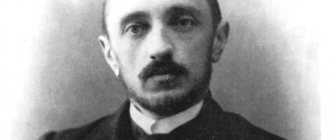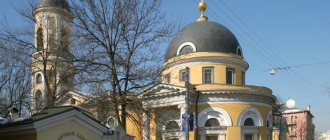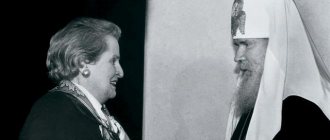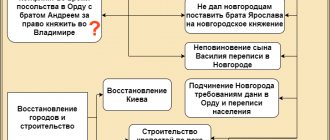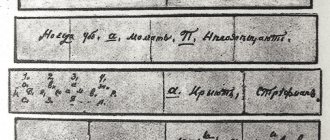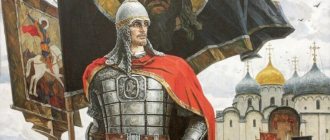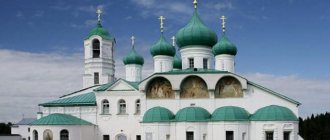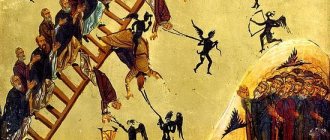The personality of Father Alexander Elchaninov is increasingly attracting historians of Russia and the Orthodox Church. He lived in the heyday of Russian culture, called the Silver Age, and was at the center of the cultural life of St. Petersburg, Moscow, and Tiflis.
When the Revolution broke out in Russia, Father Alexander went into exile, was at the center of the life of the Russian diaspora, a priest of the Russian Orthodox Church Abroad, and one of the founders of the Russian Student Christian Movement (RSCM).
After his death, his “Records”, diary materials, and memoirs of representatives of the Russian diaspora about him were published, in which the Orthodox reader can now discover outstanding examples of spiritual wisdom and Christian humility.
Faith, God, Christianity:
Faith comes from love...
Knowledge through love.
Love for God is proof of His communication with us.
The arguments of faith are not against reason, but in addition to it. Only in the light of love does the mind accept the visible absurdities of faith.
Philosophizing is not theologizing, “If you truly pray, you are a theologian” (Reverend Neil of Sinai). Inner perfection is necessary to understand the perfect.
The otherworldly lives in other forms. If we talk about him, we will speak in carnal language. This is where the chaste silence of the Church comes from.
To the usual demand of non-believers - immediately, immediately “prove”: - you will not prove any scientific, mathematical truth to a drunk person; so here too.
Expecting and demanding miracles is not only ungodly, as a manifestation of distrust of God, but also meaningless - after all, we have millions of miracles that have happened, and if they did not convince us of anything, then why should this particular (n+1) miracle convince us? ?
For many, Orthodoxy is still just a “worldview.”
The indifference of believers is a much more terrible thing than the fact that non-believers exist.
The essence of faith and religious life is not forced obviousness, but rather effort and choice. Faith is the path to God, an experience that always succeeds. The righteous sought heaven, and it accepted them. “Draw close to God, and God will draw close to you.”
What is scary for faith is not negative polemics, not the test of its mind - it will withstand this test. She is afraid of our weakness of spirit, “heartfelt apostasy” (Kireevsky’s expression).
God created life.
The devil defeated her by death.
God reflected the victory of death with the Resurrection.
Worship of the cross, a shameful instrument of execution, has taken away the most internally free people from Christianity.
Is it not a miracle that the ancient world, the world of that time - tired, decayed, decrepit - so quickly accepted the youthful, fresh power of Christianity? Yes, truly, the appearance of Christianity is a miracle of God's power.
God does not force or force us. Faith is an act of free choosing love.
The future priest Alexander Elchaninov studied at St. Petersburg University
In 1900, Alexander Elchaninov entered the Faculty of History and Philology of St. Petersburg University, studying theology and literature. Had an obligation to return as a teacher to the Caucasus District.
During his studies, he tried to transfer to study in Moscow, closer to Florensky and Ern, but remained in St. Petersburg, because he received a scholarship here, which he was paid from Tiflis. In 1902 - 1903 Alexander became close to D. S. Merezhkovsky and Z. N. Gippius, the philosophical and literary circles of St. Petersburg.
High school students Vladimir Ern, Pavel Florensky, Alexander Elchaninov. 1900 Photos from students' personal files. During his studies, Alexander Elchaninov became friends with V. Ern and P. Florensky, who influenced his decision to become a priest. Photo: nasledie-rus.ru
Elchaninov took part in meetings of Religious and Philosophical Meetings. In 1903, he published his first article in the magazine “New Way” entitled “On the mysticism of Speransky.”
In it, based on the handwritten notes of M. M. Speransky, stored in the Public Library in St. Petersburg, he examined the little-known side of the life of this outstanding statesman. In 1906, his article was published in the journal “Theological Bulletin” with a foreword by Florensky.
The first one was published In 1906, the first article by Alexander Elchaninov was published.
After graduating from the university, Elchaninov received an offer to stay with him for scientific work, but refused and moved to Moscow, and later joined Florensky in Sergievsky Posad.
Under the influence of Florensky, in 1905 he entered the Moscow Theological Academy, but left it early, considering that the training program was too general and theoretical in nature.
Misconceptions:
What false ideas can lead to! This is how many revolutionaries ruined their souls, who, based on the correct but limited idea of the people's good, came to satanic malice, lies and murder. The same awaits the servants of the national idea, until they subordinate it to a higher idea.
Even if we take the point of view of the most ardent atheism, then even then the position of believers is firmer and more correct than the position of atheism, which is open bankruptcy. Isn't it better to have hopes and promises than not to have this?
Good and evil, will, intentions, sin and repentance:
Evil is not a bad habit, a wrong attitude of the soul - it is, exactly, an influx of devilish power. This is especially clear in the experience of anger.
Evil and good are not a collection of good or evil actions; this is an evil or good force that controls a person... “Good” in terms of the result of the deed (feed, help, etc.), can be essentially evil, coming from a person obsessed with evil; and unsuccessful, stupid, even harmful deeds can be good - coming from a good source, having good motives.
About non-resistance to evil - Tolstoy understood outwardly and with this commandment of love introduced a lot of confusion and evil: denial of state regulations, courts, a mood of rebellion. Ascetic understanding is the fulfillment of this commandment in (personal morality).
Nothing that God has created is evil; we pervert ourselves, transform ourselves and everything around us into evil; This turn to evil is our free will.
What is pure or not pure is not the thing or action itself, but a displacement, a violation. Manure in the field is the joy of the owner: bread is made from it; and on the table it is a riot.
The essence of the matter is not in deeds, words, actions, but in what your heart is filled with. A good deed is not one that is apparently good, but one that comes from the fullness of a merciful heart; Likewise, evil words and deeds are splashes from a heart filled with evil power.
Whoever gives free rein to the good movement of his heart, first of all, he himself is enriched - a bright healing power, joy, peace enters his soul, healing all the diseases and ulcers of our soul. The hard-hearted person is the opposite - he squeezes his heart, he lets cold, enmity, death into it.
What increases our spiritual strength? - overcome temptation.
Everything sinful in us is so alive and full-blooded that our usual sluggish repentance is in no way commensurate with this element of sin that possesses us.
The saints’ sense of their deep sinfulness comes from their closeness to the source of light—Christ.
Cleansing from sin leads from faith to knowledge.
Sin that burdens the conscience will not be forgotten.
Sin is a destructive force - and above all for its bearer; Even physically, sin darkens and distorts a person’s face.
These are the steps by which sin enters us - image, attention, interest, attraction, passion.
If we look at the writings of ascetics and holy fathers, what depth of psychological analysis we will find there, what subtlety in distinguishing mental states, what accuracy of definitions and classification of all sensations.
Self-denial, which is talked about so much in the practice of Christianity, is understood by some as an end in itself, and they see in it the meaning of the life of every Christian... Just the opposite: in self-denial there is liberation from slavery to sin (without it - captivity) and the free revelation of one’s true essence in its God's original plan for us.
It is bad not to have bad thoughts, but to succumb to them. We are not free in them, such is our nature, darkened by sin; The saints also had thoughts. Our free pursuit of thoughts or the fight against them is where our victory or defeat lies.
The ability to see the dark side in everything, even good things, shows not so much the presence of this darkness, where we see it, as it precisely exposes our darkness and general sinfulness.
In confession, the most important thing is the state of the soul of the penitent, whatever the confessor may be. It is your repentance that is important, not him telling you something. In our country, the personality of the confessor is often mistakenly given primacy.
Pride and humility:
The proud person is deaf and blind to the world; he does not see the world, but only his own reflection in everything.
All virtues are nothing without humility.
Pride - hence pride, hence partiality, inability to self-esteem - hence stupidity. Every proud person is stupid in his assessments, even if by nature he had a brilliant mind. And conversely, the humble is wise, even if he is “foolish”; the essence of wisdom—the sense of Truth and humility before it—is accessible to him.
The feeling of one's extraordinary sinfulness is often, especially in youth, a modification of the same passion of pride. “I am unusual in everything, even my sins are stronger and brighter than others!”
Human limitation in itself is not stupidity. The smartest people are necessarily limited to some extent. Stupidity begins where stubbornness and self-confidence appear, i.e. display of pride.
Love:
All love brings satisfaction and reward in itself.
...we have been given the supreme law of life, which directly leads us to God - love, a difficult, thorny path, and along it we must carry our cross, without turning to detours.
Love is only love when it is for everyone without exception. As long as this is love only for those whom “I” love, it is not love, but selfishness. I’m talking now about Christian love, not about love in marriage or family.
...the only road in marriage is love, it’s so scary to lose it, and sometimes it disappears from such trifles that you need to direct all your thoughts and efforts here (and also to the “divine”) - everything else will come by itself.
Brief biographical information
Date and place of birth
: March 1 (13), 1881, Nikolaev November 18, 1905 - member of the council of the Moscow Religious and Philosophical Society in memory of Vladimir Solovyov Since 1907 - member of the Circle of Seekers of Christian Enlightenment Since 1910 - teaching classes, lectures at the Higher Women's Courses in History religion and about the new Russian religious and philosophical thought 1912 - teacher at the Tiflis gymnasium, 1914 - director of the gymnasium 1921 - moved with his family to Nice 1926 - ordained a priest and appointed to serve in the Orthodox Cathedral in Nice 1934 - appointed to the Alexander Nevsky Cathedral in Paris (he only served there for a week)
Date and place of death
: August 24, 1934 (died after a long illness)
Actively participated in the life of RSHD1.
Compiled a thematic selection of spiritual instructions of St. right John of Kronstadt.
Without apparently being personally acquainted with A.V. Elchaninov, S.I. Fudel knew him as a friend of the priest Pavel Florensky, and later carefully read and quoted with approval the “Records” of Father Alexander. Father Alexander is related to Sergei Iosifovich not only by his social circle, but also by his understanding of the Church, to the gathering of which he dedicated his life.
Man, society:
Christianity taught us to love and value in a person not his attributes and virtues, but his essential core - his soul, and it was the first to proclaim the absolute value and uniqueness of every human soul... All the blessings of the world are nothing before this value of the soul - “what good does a person have if will he gain the whole world, but lose his own soul?
The opinion of other people about us is the mirror in front of which almost everyone without exception poses.
Our unmercifulness, inexorability, mercilessness towards people is an impenetrable curtain between us and God. It's as if we covered a plant with a black cap and then complained that it was dying without sunlight.
God's is to love those who hate. Diabolical - to hate, to insult those who love. Humanity is to love those who love, to hate those who hate. But - “be perfect like our Heavenly Father.”
essays
- Elchaninov Alexander, Fr., Ern, Florensky P. A.
History of religion.
With the application of the article: On the inconsistency of the modern non-religious worldview. - Moscow: Polza, 1909. - 246 p. Contents: Primitive religion, Religion of ancient Greece, Buddhism, Judeo-Israelite religion, Christianity, Orthodoxy, Russian sectarianism (Khlysty and Skoptchestvo.) - Elchaninov Alexander, Fr.
Essays on the history of pedagogical teachings.
- M.: Polza, 1911. - 231 p. — (Pedagogical Academy in essays and monographs). Contents: Pedagogical ideas of the ancient world - V. Ivanovsky, Christianity and medieval pedagogy - A. Elchaninov, Locke - V. Uspensky, Jean-Jacques Rousseau.
- A. Krasnovsky, F. A. Wolf and the new humanists - N. Smirnov, I. F. Herbart and his school . - Elchaninov Alexander, Fr.
From meetings with P. A. Florensky // Vestnik RHD. - 1984. - No. 142. - P. 68-78. - Elchaninov Alexander, Fr.
Records. — 6th ed., add. - Paris: YMCA-Press, 1990. - 176 p. - Elchaninov Alexander, Fr.
and others. History of religion. People's University. - M.: Runik, 1991. - 249 p. - Elchaninov Alexander, Fr.
Records. Life in Christ. - M.: “Soviet Russia”, 1992. - Elchaninov Alexander, Fr.
Records. - M.: Sretensky Monastery (publishing house), 1996.
Life:
We either look longingly at the past, or wait for the future, when, as if, real life should begin. The present, i.e. what is our life is lost in these fruitless regrets and dreams.
The commandment “be like children” and “do not worry about tomorrow” may also include advice - to trust God in this matter.
Give up the point of view of personal judgment and take the point of view of God's work in the world.
The passage of time is scary when you stand still. We must plunge into the depths where time is indifferent.
Happiness is not an end in itself; it is a derivative of right life. If life is built correctly, there will be happiness: and a right life is a righteous life.
Notes:
- RSHD - Russian Student Christian Movement.
- Quote according to the book A. V. Elchaninov
. Records. P. 6. - Right there. P. 7.
- Right there. S. 8.
- Right there. P. 9.
- Right there. P. 12.
- Right there. P. 248.
- Right there. P. 65.
- Right there. P. 33.
- Right there. P. 79.
- Right there. P. 171.
- Right there. P. 126.
- Right there. P. 175.
- Also includes sermons and memories of Fr. Alexandra Metropolitan Eulogius (Georgievsky), prot. S. Bulgakov, prot. S. Chetverekova, M. Zernova, L. Zander and others.
